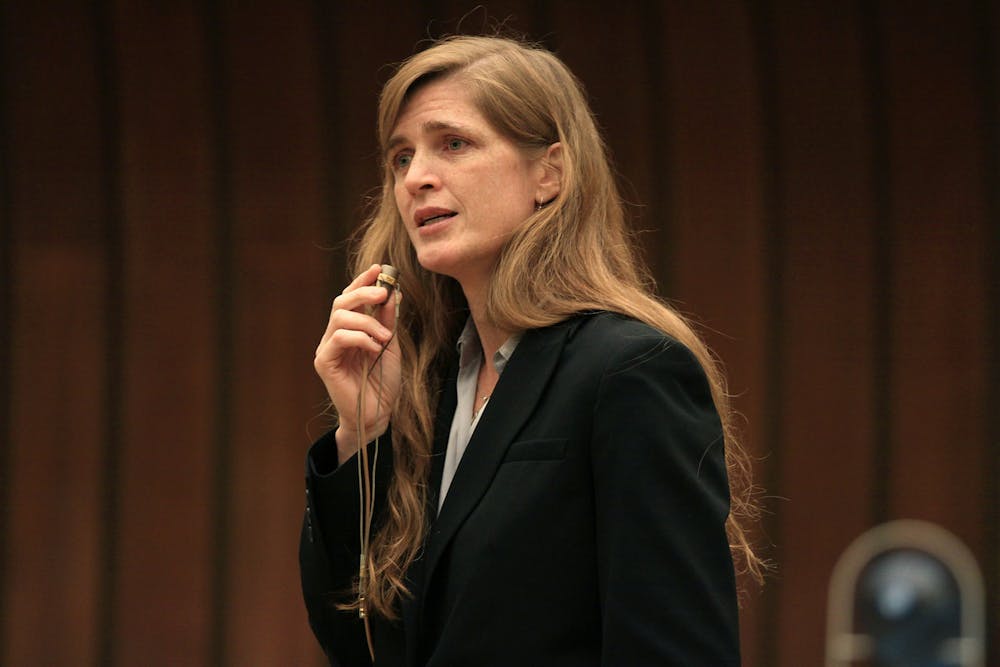The University announced last week that the Administrator of the U.S. Agency for International Development (USAID), former U.S. Ambassador to the United Nations (UN) and Pulitzer Prize-winning author Samantha Power will give the commencement speech for the Class of 2022 on May 22.
Through her role as USAID administrator, Power leads staff working in 100 countries to advance progress on development assistance and issues such as food security, education, women's empowerment and global health. Powers has worked on issues including efforts to surge global vaccinations, climate change and conflict and humanitarian crises.
Power spoke at the University as a part of the Foreign Affairs Symposium (FAS) speaker series in 2018 to discuss the importance of diplomacy and national unity. During her discussion, members of Students for a Democratic Society held a silent protest due to Power’s decision to advocate for the 2011 military intervention in Libya and authorizing U.S. support for Saudi Arabia’s bombing in Yemen.
Senior Aaron Harris feels that Power has used her position to advocate for the expansion of Western military dominance in an email to The News-Letter.
“[Power’s] career is defined by ‘political realism,‘ which simply means she more honestly embraces the destruction and instability politicians at her level bring about every day, with no liability to the public and extremely little self-awareness,” he wrote.
Power served in the Obama administration during both terms, served as the U.S. ambassador to the U.N. from 2013 to 2017 and served on the National Security Council staff as special assistant to the president and senior director for Multilateral Affairs and Human Rights from 2009 to 2013. As a special assistant, Power worked on issues such as UN reform, LGBTQ and women's rights and human trafficking and global corruption.
In an email to The News-Letter, Vice President for Communications Andrew Green discussed Power's contributions as a journalist, humanitarian and diplomat.
“At a moment when international engagement is at the forefront of our minds, when democracy is at risk and humanitarian crises are playing out before our eyes, she brings an invaluable and inspiring perspective to our graduating class,” he wrote. “Power has dedicated her life to improving lives and defending humanity.”
Power’s book "A Problem from Hell": America and the Age of Genocide won the Pulitzer Prize in General Nonfiction in 2003 and her most recent book, The Education of an Idealist: A Memoir, has been selected as one of the best books of 2019 by various publications. Prior to her roles in the U.S. government, Power was a columnist for TIME and a contributor to The Atlantic, The New Yorker and The New York Review of Books.
Senior Sylvana Schaffer expressed her enthusiasm about the University’s decision to select Power as commencement speaker. She explained that she believes Power to be a key placer in the last decade of U.S. foreign policy and that she looks forward to hearing her speech in an email to The News-Letter.
“Power's career spans academia, journalism, politics and a decent portion of the U.S. foreign policy apparatus,” she wrote. “Power represents some of our country's best, and I have no reason to think she doesn't embody the University’s mission in choosing a commencement speaker.”
Senior Class President Nathan Mudrak expressed admiration for the many roles Power has taken through the course of her career in an email to The News-Letter. He elaborated that the Class of 2022 has lived through what he believes are the most consequential years of the 21st Century. Mudrak believes that Power’s wisdom will be invaluable to the graduating class and that her speech will empower the graduates to make equitable and positive change as they move forward.
According to Harris, the University’s decision to choose Power as a commencement speaker does not reflect the nature of the student body.
“As for the values of the graduating class, I think getting a politician such as Power, who has supported the destabilization of numerous countries abroad, is choosing one of the worst people to represent the cosmopolitan nature of the diverse student body,” he wrote.
Green described the process of selecting a commencement speaker, explaining that the University aims to identify someone who will inspire graduates and reflect the values of the University and offer insight that students can carry into their future endeavors.
“As in past years, the process of choosing a commencement speaker is closely tied to the honorary degree selection, which is managed by the Board of Trustees office,” he wrote. “Students, faculty, alumni, staff and friends of the University are invited to submit nominations online.”
Sylvana Schaffer is a contributing writer for The News-Letter. She did not contribute reporting, writing or editing to this article.





